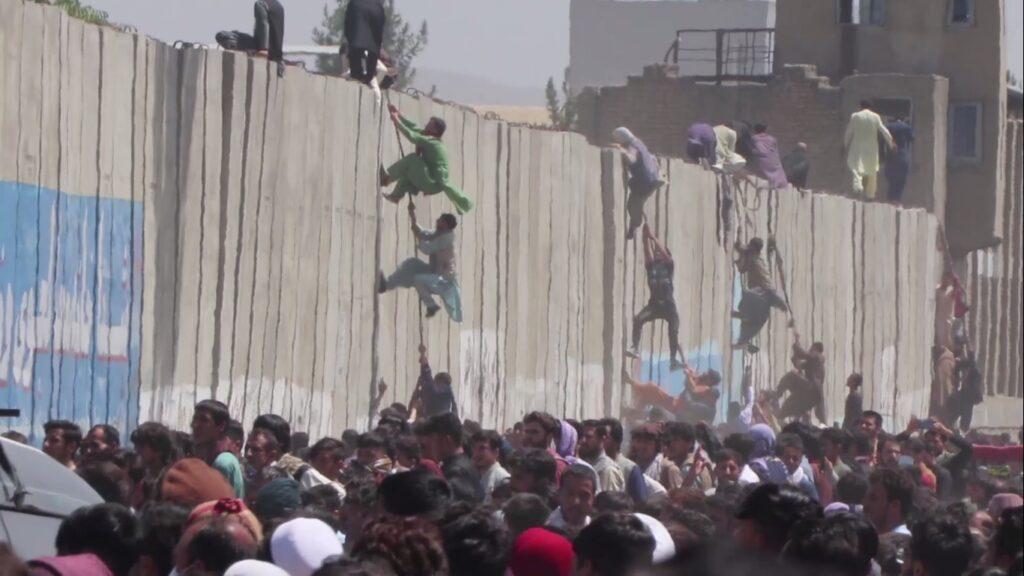KABUL (Pajhwok): Some Afghans say although security has improved after the fall of the previous government, poverty, unemployment and uncertainty about their children’s future have forced them to leave the country.
On August 15, the Taliban took control of Kabul after capturing most of the provinces. Former president Ashraf Ghani fled the country as the state system collapsed rapidly.
After the fall of the Ghani administration, the Islamic Emirate took over the country. The security situation has since improved. But due to a halt to imports, prices of fuel, food, medicine and other items have sky-rocketed.
Pajhwok Afghan News interviewed several individuals within the country and abroad, most of whom cited economic problems and unemployment as the main reasons for their immigration.
Some say they have lost their jobs while others fear the Taliban may prevent women from working and studying. Many Afghans believe their personal safety may be at risk.
Some of them even complain about not receiving their salaries over the past two months.
Homeless forever
Ahmad Javed, the sole breadwinner for his four-member family, said he had worked for the United States Agency for International Development (USAID) for a decade.
With the return of the Taliban, the USAID office in Kabul was closed. “I was in the office when I came to know that the Taliban gave surrounded Kabul.
“I could not believe it. All staffers rushed to their homes. We feared that war might break out. Fortunately, however, they took over Kabul without fighting,” he added.
Javed, who rushed home at around 12:00 noon, found his family gripped by fear of war and thinking about their strategy.
“When I came home, my mother asked: ‘What are you going to do? All our neighbours went to the airport to kill themselves. What should we do?”
He recalled: “In the course of discussions, I got a call from the office to get to the airport immediately and there rushed.”
According to Javed, the airport was so crowded that several people were trampled on, and they could not board the plane. They had to return, fearing his old mother and children would get stuck in a possible stampede.
The tense situation, coupled with the loss of job, compelled Javed to go to the airport and try his luck once again.
“The same morning I prayed and told my mother and wife to go, as it was no longer possible to work here. We should not waste time. We worked very hard to get close to the plane. The Americans used tear gas and we came home yet again.”
But insistence from relatives, friends and near ones brought Javed back to the airport. This time, he and his family managed to board a US military plane.
Eventually, Javed and his family flew from Kabul to Qatar. After spending a week in Qatar, they were flown to Germany and from there to the US.
“When we left Kabul, I was so glad flying into the sky. Today, we are in a refugee camp in Virginia. There are no longer under threat from the Taliban. I know we have become homeless forever … my heart bleeds with suffering.”
Uncertainty about immigration
Ruqia, 50, has to support her family of five. She was in Mazar-i-Sharif for two weeks, hoping to reach the US. She opted for taking the road to immigration after losing her job.
Optimistic of bright future, Roqia is spending the toughest days and nights of her life in a guesthouse with dozens of other families in Mazar-i-Sharif.
She worked for a non-governmental organisation and lost her job after the government fell to the Taliban.
In a telephonic conversation with Pajhwok, she said: “The day the Taliban returned, we were all at home and had guests as well. Suddenly, my daughter came and said the Taliban had reached Kabul.
“I got a call from the office. The caller told me to turn off my phone. I was very afraid and they wanted me to go to the airport. However, I could not board the plane that was so crowded.”
Extremely concerned about her current situation, she was encouraged by colleagues to go to Mazar-i-Sharif and from there to the US.
“We took the path of migration, we swear that do not understand what is happening, we live in a world of destiny, like us, dozens of families are here and their fate is unknown,” he said.
Loss of job and poverty
Arezo (not a real name), who was working for a media outlet in Kabul, said: “An end to the war in the country has been a long-standing dream for me and my family. Now that the security environment has improved, poverty and unemployment have forced us to leave our homeland.”
The girl, who left Afghanistan with her family three days after Kabul fell to the Taliban, is yet to reach her destination.
Another reporter, who now lives with his wife and children in Virginia, said he left the country because he thought unemployment and the change of the government would cause him economic hardship.
If assured of safety and employment, he promised returning to the country soon.
In the previous government, about 450,000 worked civil servants and 350,000 as soldiers, with thousands serving in non-governmental organisations and UN agencies.
However, Deputy Minister of Information Zabihullah Mujahid and other officials insist all employees of the former government, including policemen and soldiers, would remain part of the new system.
They say the people of Afghanistan have suffered a lot and no one, including those who fought alongside the opposition, will be safe in the country.
sa/mud







GET IN TOUCH
NEWSLETTER
SUGGEST A STORY
PAJHWOK MOBILE APP